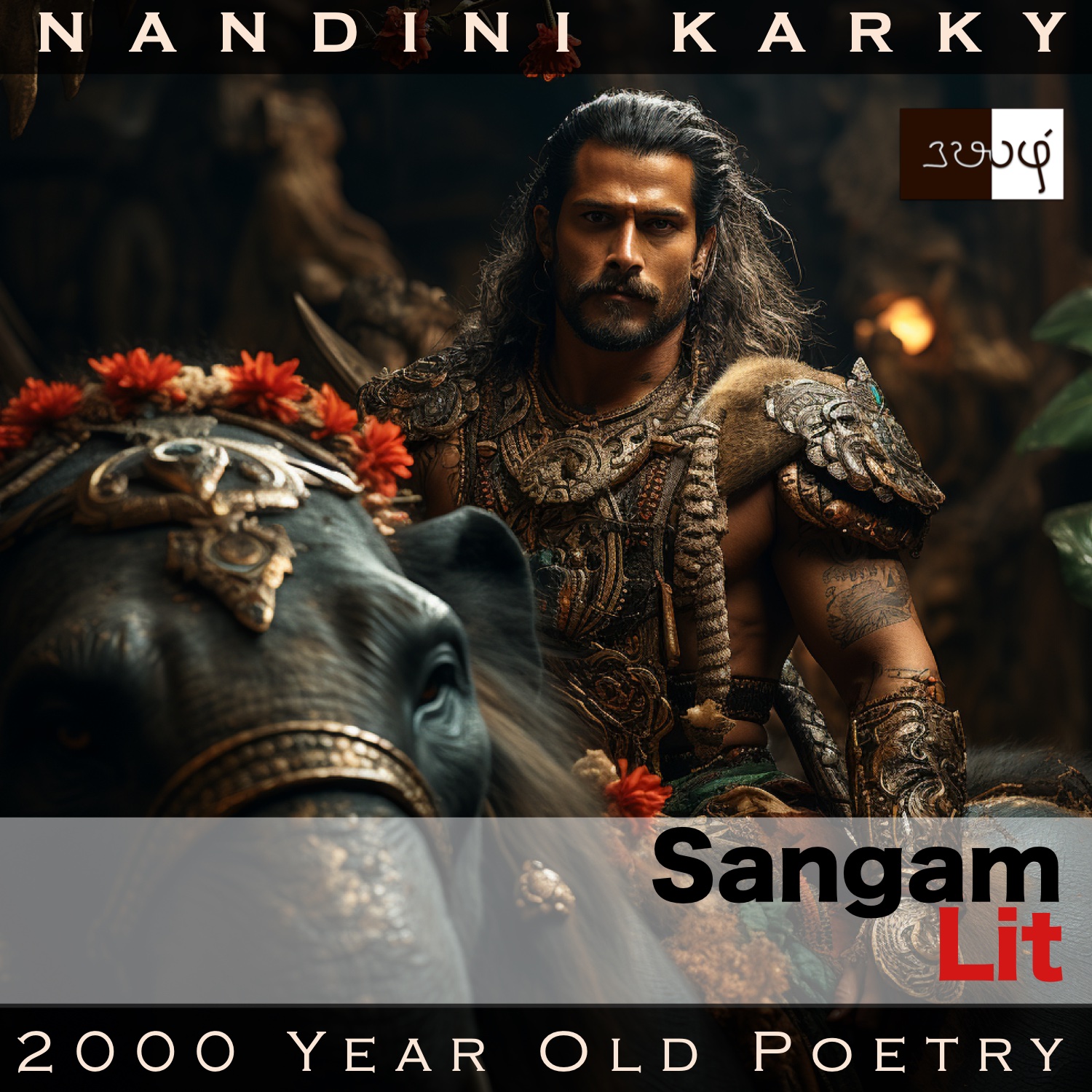Podcast: Play in new window | Download
Subscribe: Apple Podcasts | Spotify | Amazon Music | Android | iHeartRadio | TuneIn | RSS | More
In this episode, we listen to the list of virtues of a king, as portrayed in Sangam Literary work, Puranaanooru 239, penned about the Velir King Nambi Nedunchezhiyan by the poet Pereyil Muruvalaar. The verse is situated in the category of ‘Pothuviyal Thinai’ or ‘Common Themes’ and attempts to resolve a dilemma about a funeral practice.

தொடியுடைய தோள் மணந்தனன்;
கடி காவில் பூச் சூடினன்;
தண் கமழும் சாந்து நீவினன்;
செற்றோரை வழி தபுத்தனன்;
நட்டோரை உயர்பு கூறினன்;
‘வலியர்’ என, வழிமொழியலன்;
‘மெலியர்’ என, மீக்கூறலன்;
பிறரைத் தான் இரப்பு அறியலன்;
இரந்தோர்க்கு மறுப்பு அறியலன்;
வேந்துடை அவையத்து ஓங்கு புகழ் தோற்றினன்;
வருபடை எதிர் தாங்கினன்;
பெயர்படை புறங்கண்டனன்;
கடும் பரிய மாக் கடவினன்;
நெடுந் தெருவில் தேர் வழங்கினன்;
ஓங்கு இயல களிறு ஊர்ந்தனன்;
தீம் செறி தசும்பு தொலைச்சினன்;
பாண் உவப்ப பசி தீர்த்தனன்;
மயக்குடைய மொழி விடுத்தனன்; ஆங்குச்
செய்ப எல்லாம் செய்தனன் ஆகலின்
இடுக ஒன்றோ! சுடுக ஒன்றோ!
படு வழிப் படுக, இப் புகழ் வெய்யோன் தலையே!
A long listicle of qualities about this Velir king, who was under the protection of the Pandiya King Nedunchezhiyan. When this king died, there seemed to have risen a question about whether the king should be buried or burnt. The poet attempts to answer that question with these words:
“He embraced bangle-clad arms; He wore flowers from the protected sacred forest; He applied moist and fragrant sandalwood;
He ended enemies and their kith and kin; He appreciated his friends; He never praised someone because they were ‘strong’ and he never bragged about himself because they were ‘weak’; He never sought anything from others; He never denied anything to those who sought from him; He reinstated his fame in the assembly of kings; He bore the assault of approaching armies; He saw the rears of retreating armies;
He steered horses faster than the speed of mind; He wielded his chariots in the wide streets; He rode on tall and noble elephants; He drank deep from pots of sweet toddy; He ended the hunger of bards; He resolved the confusion of those who came seeking to him;
And so, as he has done all that is to be done, you may bury him or burn him; It matters not what you do to the head of this man, whom fame loved!”
Let’s explore the details herein. The poet starts by talking about how the king enjoyed the company of his royal maiden clad in bangles. He mentions about the king’s liking to wear flowers from the sacred forest and apply fragrant sandalwood on himself. All this marks how the king gave importance to one domain of duties according to Sangam tradition, which is living a life of joy and pleasure, defined by the Tamil word ‘Inbam’.
Next, the poet moves on to talk about how the king always routed his enemies and celebrated his friends; Just because someone was strong, the king would not bow low before them and praise them no end. On the other hand, just because someone was weak, the king wouldn’t go about talking his own praise, the poet adds. This is followed by mention of the king’s nature never to seek anything from anyone and at the same time, never to deny anything to those who came seeking to him; He stood with his head held high in the assembly of great kings and he had the ability to face any army and defeat it so that he saw the rears of the retreating enemy every time. In this grouping of qualities, we observe how the king fulfilled his duties of virtue and justice, defined by the Tamil word ‘Aram’.
Finally, the poet talks about how the king possessed horses as fast as one’s mind, chariots that sailed on wide roads and elephants that the king mounted. The spotlight next falls on how the king drank from huge pots of toddy, ended the hunger of bards and removed the confusions in supplicants who came hoping to him. If we pause and understand what this list of qualities pertains to, it will be evident that the poet is detailing how the king fulfilled his third and final duty, that of having wealth, defined by the Tamil word ‘Porul’.
Thus, since the king excelled in every domain of life, it ultimately matters not if he was buried or burnt, for the king’s fame would always live long, the poet concludes. Now, we can explore the question of why there need be a confusion about burial or burning. This could be a dilemma arising out of the way the king died. There could have been different practices for when a ruler died fighting in the battlefield and when he died by other causes. But what happens when you have a noble warrior, celebrated in the battlefield, but who happens to die by other causes. Perhaps that’s the confusion that arose upon this king’s death. While that may be the fringe issue here, at the core, the verse makes us see with clarity all the qualities that were celebrated in Sangam times!




Share your thoughts...